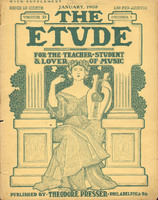While the gifted young violinist is yet struggling with the rudiments of his art, there is so much that necessarily occupies his time and strength and interest that he cannot reasonably be expected to turn his thoughts to the day when he will choose, either voluntarily or by force of necessity, the path of art in which he is to walk during the most important years of his life. For him the all-absorbing question is, during these first years, instrumental progress and all that it implies. Beyond a strong craving to achieve the things that will satisfy, or at least gratify, his musical needs, his thoughts rarely take definite shape regarding the probable outcome of his striving. He neither weighs artistic or financial possibilities nor formulates practical plans whose development may ultimately lead him to victory. He thinks and dreams of his fiddle and of music. The practical questions which, in later life, are found to be inseparably associated with art have no concern for him.
But the day inevitably arrives when the young artist must decide the serious question of which direction he will take; and, finding himself unprepared to settle so weighty a question, he is guided in his choice, not by reason, but by impulse. That is, he almost invariably yields to desire, and rarely takes into consideration the possible consequences of his decision. Unless influenced by fear, or some uncommonly forceful reason or condition argues against the choice, he resolves to enter the soloist’s ranks, and disdainfully refuses to consider other fields of musical endeavor. The orchestra makes no appeal to him, either as a means of earning his livelihood or as a fitting medium for the demonstration of his musical gifts. Indeed, he regards all orchestra players as unfortunate men who are compelled to go through life wearing the badge of disgrace disclosed to the pitying eyes of the world. And if the orchestra is revolting to his pride and self-esteem, there is certainly no phase of the teacher’s life that seems to promise happiness and reward. Success, prosperity, artistic glory seem within easy reach of the soloist; little wonder then that the hopeful young artist fails to see his true possibilities, and turns from the path which gives some promise of happiness and prosperity.
It is true enough that happiness is not easily found in orchestral life. Nor is the material compensation adequate for long years of toil and devotion to one’s art. Neither is the teacher’s life a bed of fragrant roses. But both the teacher and the orchestra player can, if they but try, make life less dismal and profitless than they usually succeed in making it.
The young player should try to understand that, at the present time, there is in the United States no actual field for the soloist. Only the foreign artist is welcomed here, and even his possibilities are strangely limited. And this being a recognized fact, the wise young man will abandon the idea of becoming a wealthy and successful soloist in the United States. What his aims should be, under existing conditions, will be told in the next issue of The Etude.



